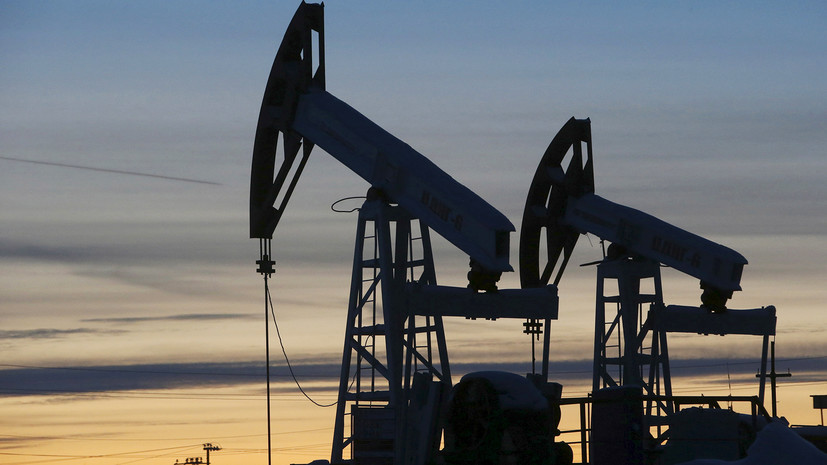World oil prices began to regain their position after what happened on the eve of the fall in quotations. This is evidenced by trading data.
As of 08:00 Moscow time, the May futures of the Brent brand rose by 2.6%, to $ 30.83 per barrel. At the same time, WTI crude oil for delivery in April 2020 on the ICE exchange in London adds 4.46% to $ 29.98 per barrel
Note that the peak in price growth occurred at 04:02 Moscow time, when WTI futures rose in price by 5.10%, and Brent - in 5.23%.
On Monday, March 16, for the first time since January 2016, the cost of raw materials of the Brent reference brand dropped to $ 29.7 per barrel. Thus, the trend continued, taken on March 9, when there was the sharpest drop in the cost of a barrel over the past 30 years.
Then, during international trading, the price of Brent, having fallen by a third, was trading at $ 31 per barrel, WTI - $ 28. Over the next few days, prices attempted a recovery and ranged between $ 32–39 per barrel.
The collapse occurred after a meeting of participants in the OPEC + transaction, which took place on March 6 in Vienna. The parties did not reach consensus on the need for an additional reduction in production against the background of the spread of coronavirus infection COVID-19 and instead decided to completely abandon all previously undertaken obligations. The point is that from January 1 to March 31, 2020, the parties to the agreement, including Russia, reduced oil production by 1.7 million barrels per day compared to the level of October 2018. The purpose of the agreements was to restore the balance of supply and demand of raw materials in the world market.
According to Russian Prime Minister Mikhail Mishustin, Moscow proposed extending the agreement “at least until the end of the second quarter or for a year,” in particular, so as not to complicate the situation due to coronavirus.
“Our position was absolutely verified and justified, since energy demand was already declining due to a slowdown in the global economy and a decrease in international trade,” Mishustin said during a government meeting on March 12.
After the failed negotiations, Saudi Arabia announced the increase in production to 13 million barrels per day, as well as the provision of record discounts over 20 years to buyers of raw materials from the United States, Northern Europe and Asia. Iraq, Bahrain and the UAE also announced a reduction in the cost of their products for customers.
In turn, the head of the Ministry of Energy of Russia Alexander Novak reported that the Russian Federation could increase oil production in April by 200 thousand barrels per day.
“Each company has its own investment plans, they now need to revise, because they proceeded from some plans - today others. Therefore, in principle, one can quickly restore the production that was reduced in connection with the agreement, ”he explained.
In addition, First Deputy Prime Minister Andrei Belousov pointed out that Russia would have to live long enough under conditions in which the equilibrium oil price is in the range of $ 35 per barrel.
“A downward rebound is possible for a number of reasons, well, and there is always the possibility that an agreement will be restored (OPEC +) in some format and prices will go up,” he said.
Low oil quotes will help to improve the market and remove high-cost projects from it. This opinion was expressed by the head of Gazprom Neft Alexander Dyukov. He also stressed that the cost of production is $ 3-5 per barrel.
According to the press secretary of Russian President Dmitry Peskov, contacts with representatives of Saudi Arabia are not planned in the schedule of meetings of Vladimir Putin, but they may appear if necessary.
Meanwhile, the situation on the world oil market with the crown prince of Saudi Arabia, Mohammed bin Salman Al Saud, was discussed by the American leader Donald Trump.
“I asked him what was going on. They have disagreements with Russia. This is what lowered oil prices. And what I can say, the price of oil is now the one that I could only dream of, ”he said.
The head of the White House initially condemned Moscow and Riyadh for the drop in the cost of raw materials, but taking into account the low price, he decided to purchase a large amount of oil for the US strategic reserve.
Nevertheless, the Western media express doubts that the situation will positively affect the positions of Washington and Trump, in particular. According to The Spectator, the “oil war” between Saudi Arabia and Russia will negatively affect Donald Trump’s chances for a second presidential term, as well as the status of the United States as an oil exporting country.
At the same time, Forbes magazine immediately cited several reasons why Moscow would become the winner in the oil price war with Riyadh. In particular, as one of the arguments they listed the ability of the Russian side to work even in conditions with a low cost of raw materials.

